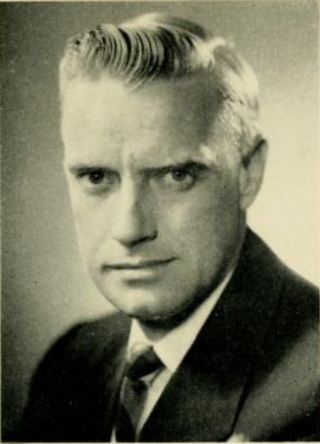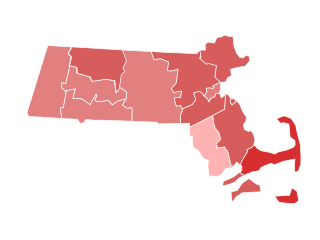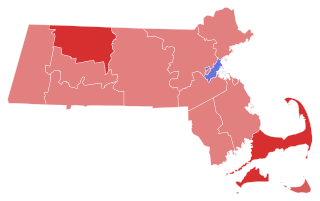The Massachusetts Republican Party (MassGOP) is the Massachusetts branch of the U.S. Republican Party.

Edward Joseph McCormack Jr., was an American attorney and politician from Massachusetts. He was most notable for serving as Massachusetts Attorney General from 1959 through 1963.

The 1936 United States Senate election in Massachusetts was held on November 3. Incumbent Democratic Senator Marcus A. Coolidge declined to stand for re-election. Republican Henry Cabot Lodge Jr. won the race to succeed him over Democratic Boston mayor James Michael Curley and former Suffolk County prosecutor Thomas C. O'Brien.

The 1962 United States Senate special election in Massachusetts was held on November 6, 1962. The election was won by Ted Kennedy, the youngest brother of then-President John F. Kennedy, who would remain Senator until his death in 2009.

The 1952 United States Senate election in Massachusetts was held on November 4, 1952, in which Incumbent Republican Henry Cabot Lodge Jr. lost to Congressman and future President John F. Kennedy, the Democratic Party nominee.

The 1946 United States Senate election in Massachusetts was held on November 5, 1946. Incumbent Democratic Senator David I. Walsh ran for re-election to a fifth term in office, but was defeated by Republican former Senator Henry Cabot Lodge Jr., who returned from service in World War II.

The 1926 United States Senate special election in Massachusetts was held on November 2, 1926.
The 1911 United States Senate election in Massachusetts was held during January 1911. Republican incumbent Henry Cabot Lodge won election to a fourth term despite intense opposition within his own party. Lodge received only five votes more than the necessary minimum for a majority.

The 1916 United States Senate election in Massachusetts was held on November 7, 1916. Republican incumbent Henry Cabot Lodge defeated Democratic Mayor of Boston John F. Fitzgerald to win election to a fifth term.

The 1922 United States Senate election in Massachusetts was held on Tuesday, November 7. Incumbent Republican Senator Henry Cabot Lodge was re-elected to a fifth term in office over Democrat William A. Gaston.

The 1944 United States Senate special election in Massachusetts was held on November 7, 1944. Republican Governor Leverett Saltonstall was elected to finish the term of Henry Cabot Lodge Jr., who had resigned from the Senate to serve in World War II.

The United States Senate election of 1930 in Massachusetts was held on November 4, 1930. Incumbent Republican Senator Frederick H. Gillett did not run for re-election. In the open race to succeed him, Democratic Mayor of Fitchburg Marcus A. Coolidge defeated former U.S. Senator William M. Butler.

The United States Senate election of 1924 in Massachusetts was held on November 4, 1924. Incumbent Democratic Senator David I. Walsh, first elected in 1918, ran for a second term in office but was defeated by the Republican nominee incumbent Speaker of the U.S. House Frederick H. Gillett. Despite winning 13 out of 14 counties in the state, Gillett was only able to win a narrow margin of 1.7%, which was largely due to Walsh's strong performance in Suffolk County, home to the state capitol of Boston, likely being carried over by fellow Republican Calvin Coolidge's strong performance in the 1924 United States presidential election.
The 1899 United States Senate election in Massachusetts was held during January 1899. Republican incumbent Henry Cabot Lodge won election to a second term easily.

Courtenay Crocker was an American attorney and politician.
A Massachusetts general election was held on November 6, 1956, in the Commonwealth of Massachusetts.
A Massachusetts general election was held on November 4, 1952 in the Commonwealth of Massachusetts. Primary elections took place on September 16.
The 1946 Massachusetts general election was held on November 5, 1946, throughout Massachusetts. Primary elections took place on June 18.
The 1944 Massachusetts general election was held on November 7, 1944, throughout Massachusetts. Primary elections took place on July 11.
The 1942 Massachusetts general election was held on November 3, 1942, throughout Massachusetts. Primary elections took place on September 15.
















